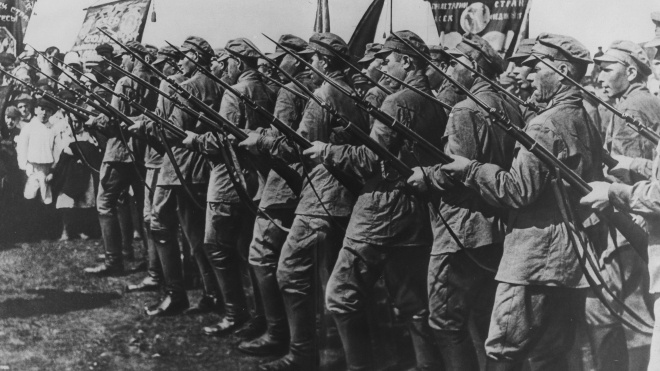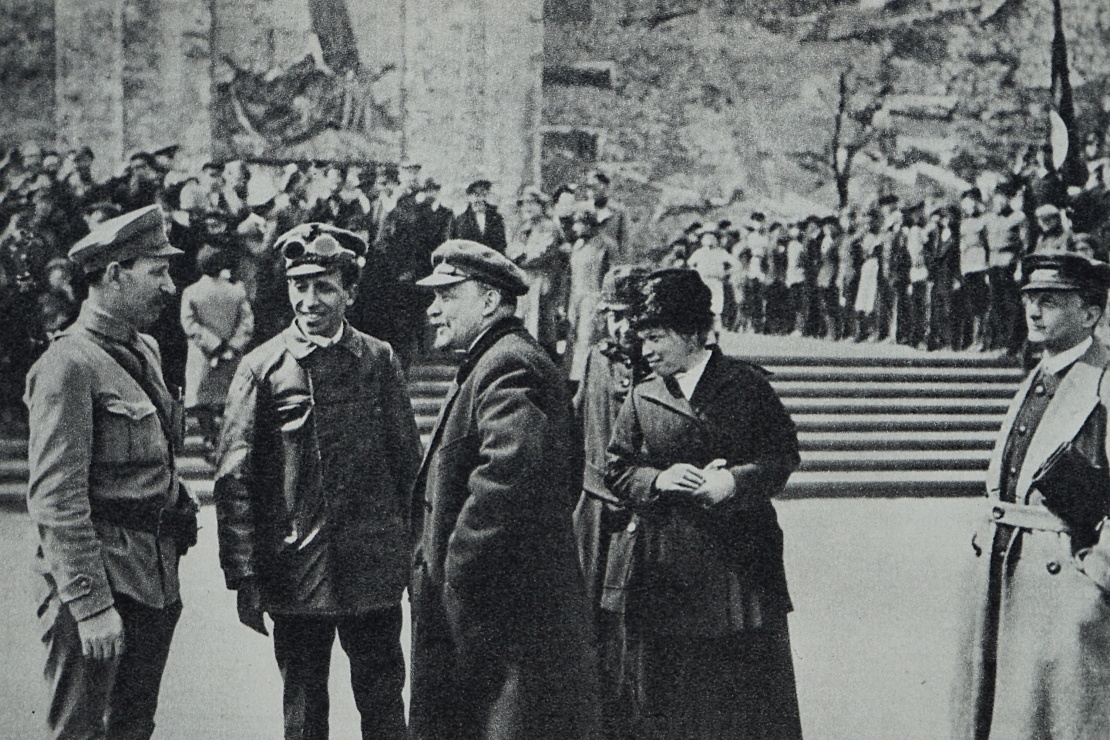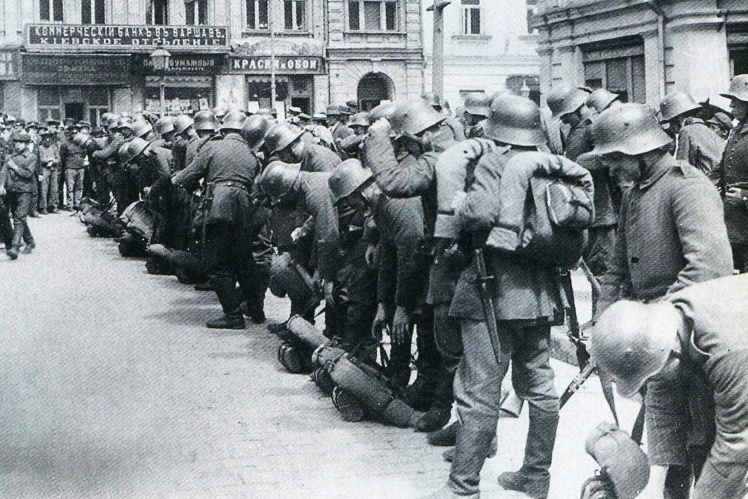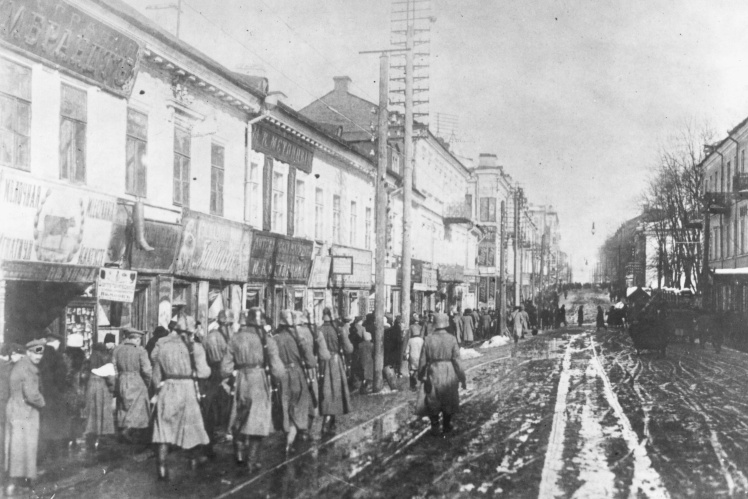Version one: confusion with dates in 1919
The official version of the Bolsheviks sounds something like this: "On February 23, 1918, under the pressure of enemies, the workersʼ and peasantsʼ government announced the need to create armed forces."
In fact, Lenin signed the decree "On the creation of the Workersʼ and Peasantsʼ Red Army" on January 15, 1918. And on January 24 of the same year, the Bolsheviks passed a decree on the transition to the Western European Gregorian calendar. After January 31, an amendment of 13 days was introduced, that is, February 14 came immediately.
Lenin on Red Square in Moscow during an inspection of the troops, February 1918.
Getty Images / «Babel'»
At the beginning of January 1919, the head of the Supreme Military Inspection of the Red Army, Nikolai Podvoiskii, proposed to celebrate the anniversary of the creation of the Bolshevik army on January 28, which was exactly the date according to the new calendar. His proposal was considered late and initially decided to abandon the celebration. But then they changed their minds and decided to combine the anniversary of the creation of the Red Army with the Day of the Red Gift, which was planned for February 17. On this day, according to the plan of the Bolsheviks, the population had to voluntarily donate gifts for the Red Army soldiers.
But it turned out that February 17 fell on a Monday that year, so the celebration was moved to the next Sunday — February 23. Then the holiday was forgotten for several years and remembered only in 1922. But for some reason the Russian authorities left the same date as in 1919 — February 23. The following year, the fifth anniversary of the creation of the Red Army was already celebrated on a grand scale. Even then, the date of February 23 was tried to be justified by the fact that the first Red Army unit was allegedly formed on that day. The next year, 1924, the date was completely falsified. A photocopy of Leninʼs decree dated January 15 (28) was published in the press with a blurred frame — the signature and date were not clearly visible. But the caption to the illustration said that the document was signed on February 23.
One of the first cavalry regiments of the Red Army, Petrograd (now Saint Petersburg), January 1918.
Getty Images / «Babel'»
Eyewitnesses of those events, even from the Bolshevik leadership, doubted this date. For example, Kliment Voroshilov, an active participant in the Bolshevik coup, wrote in his 1933 article dedicated to the 15th anniversary of the Red Army that "the timing of the celebration of the anniversary of the Red Army to February 23 is rather random and difficult to understand and does not coincide with historical dates."
Version two: fictional victories over the Germans in 1918
The myth of the "victory" over the German army near Pskov and Narva on February 23, 1918 originated in Bolshevik propaganda. It was finally formulated in 1938 from Stalinʼs personal proposal. The official version now sounded like this: "At Narva and Pskov, the German occupiers were decisively repulsed. Their advance on Petrograd was stopped. The day of repulse to the troops of German imperialism — February 23, 1918 — became the birthday of the young Red Army."
Joseph Stalin (left) and Kliment Voroshilov during the Congress of Soviets in Moscow after voting for the new Constitution of the USSR, December 5, 1936.
Getty Images / «Babel'»
In fact, it was the other way around. Since the end of 1917, the Bolsheviks have been negotiating peace with the countries of the Quadruple Alliance — the military-political bloc of the German Empire, the Austro-Hungarian Empire, the Bulgarian Empire, and the Ottoman Empire, which opposed the Russian Empire and other Entente countries in the First World War.
After the October coup of 1917, the Bolsheviks started a civil war. At that time, various nations that were part of the empire, including the Ukrainian one, began to fight for their national states.
The Bolsheviks dragged out the negotiations in Brest as much as they could, and in the meantime tried to establish Soviet power in Ukraine, Belarus, and the Baltic states by force. And the Germans demanded that the Bolsheviks vacate these territories. The final answer was to be given by a delegation led by one of Leninʼs closest associates, Leo Trotsky, on February 10, 1918. But his answer surprised everyone. He announced that Soviet Russia was withdrawing from the war and demobilizing the army, but at the same time refused to sign a peace treaty with Germany.
Leo Trotsky delivers a speech to Red Army soldiers, 1918. After an apparent failure to stop the German offensive in February 1918, Trotsky was appointed commander of the Red Army in March and tasked with transforming it into an effective, disciplined, fighting force.
Getty Images / «Babel'»
In response, the German command announced that the armistice between Russia and Germany would end on February 18 and the state of war would be restored. On this day, German troops went on the offensive along the entire front from the Baltic Sea to the Carpathians. And within a few days, the cities of Ukraine, Belarus, and the Baltic states captured by the Bolsheviks were liberated.
They actually met no resistance. Panic seized the Bolshevik troops, their garrisons often fled from the cities even before the approach of the German troops. According to newspaper reports, only 42 Germans in two cars arrived at the Lutsyn railway station. They were very tired, but they did not meet any resistance, so they first went to the buffet and had a good meal there.
German troops in Kyiv, 1918. German troops enter Minsk, 1918.
Wikimedia; Getty Images / «Babel'»
At that time, panic reigned in Petrograd. On February 21, 1918, the Bolsheviks announced that those residents who did not voluntarily sign up for the Red Army would be forced to dig trenches around the city. But such "volunteers" did not produce combat-ready troops. In his February 25 article in the Pravda newspaper, Lenin characterized the situation of those days as follows: "Painful and shameful reports about the refusal of the regiments to hold their positions, about the refusal to defend even the Narva Line, about the failure to comply with the order to destroy everything during the retreat; whatʼs to say about deserting, chaos, helplessness, sloppiness."
Registering of volunteers for the Red Army, 1918.
Getty Images / «Babel'»
As for February 23, 1918, according to historians, there were no major battles between German troops and the Red Army on that day. On the evening of February 23, the Germans were approximately 50 kilometers from Pskov and 170 kilometers from Narva. Instead, on this day, the Bolsheviks in Petrograd received a German ultimatum on the terms of peace — they had to recognize the independence of Latvia, Lithuania, Estonia, Finland, and Ukraine. At three oʼclock in the morning on February 24, the ultimatum was accepted.
Delegations of the countries of the Quadruple Union after the signing of the Brest Peace with the Bolsheviks, March 3, 1918.
Getty Images / «Babel'»
Map of the results of the Peace of Brest. The line where the German troops stopped on March 4, 1918 is marked in red. Countries that gained independence from Russia are marked in blue.
Getty Images / «Babel'»
As for Pskov and Narva, the Germans captured them in about the same way as other cities — practically without resistance. German troops occupied Pskov on February 25, and the very next day they received a Soviet delegation from Petrograd, which was going to Brest to sign a peace treaty.
The Germans approached Narva on March 3. Here they were to be stopped by the first Soviet peopleʼs commissar for maritime affairs, Pavel Dybenko, together with a detachment of "revolutionary sailors". After a short skirmish five kilometers from Narva, Dybenko and his soldiers fled first to Gatchina and then to Samara. For this, in May 1918, he was brought before a tribunal, but then he was acquitted and again entrusted with the command of units of the Red Army.
Pavel Dybenko (left) together with Nestor Makhno, November 1918.
Getty Images / «Babel'»
The next morning, the first units of German troops entered Narva on bicycles. But on March 4, the Peace of Brest entered into force, under the terms of which the Bolsheviks agreed to all German demands, recognized the defeat of Russia and its exit from the First World War. Therefore, the German army did not advance further and stopped at the Pskov-Narva line. And the Bolsheviks managed to stay in power in this way.
Translated from Ukrainian by Anton Semyzhenko.
The Kremlin is used to twisting history. We honestly talk about various historical events, and you can support us by donating: 🔸 in hryvnia, 🔸 Buy Me a Coffee, 🔸 Patreon, 🔸 PayPal: [email protected].
A squad of German cyclists chases a gang of marauding Bolsheviks, March 28, 1918.
Getty Images / «Babel'»




